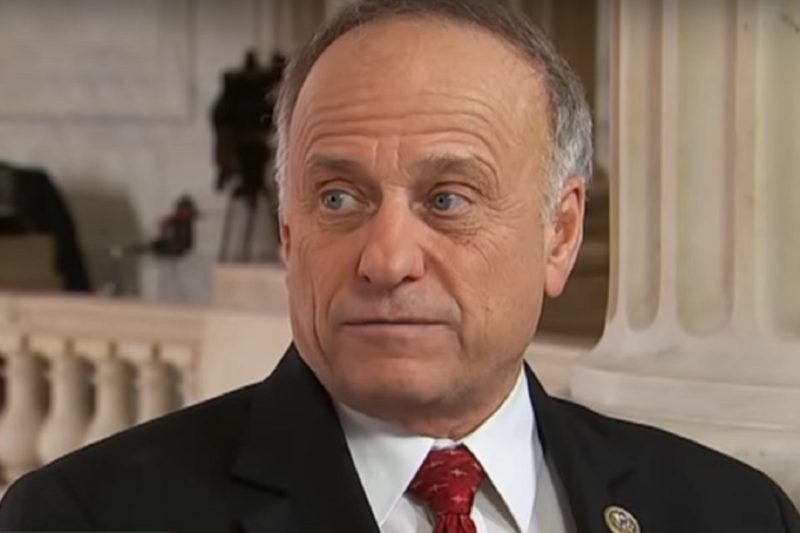Republicans Voice Hardline Religious Imposition Rationales for Congress, Trump
Rep. Steve Cohen (D-TN) warned that Republicans could introduce legislation statutorily strengthening the federal religious imposition law in the absence of similar rumored action from the White House.

A handful of Republicans in the U.S. House of Representatives appear set to strengthen the mother of all religious imposition laws—the federal Religious Freedom Restoration Act (RFRA).
Led by Rep. Steve King (R-IA), the Confederate-flag-displaying, reproductive rights antagonist behind a proposed total abortion ban, the House Judiciary Committee’s Subcommittee on the Constitution and Civil Justice considered the “state of religious liberty in America” last week during an unusually modulated hearing. Under former chair Rep. Trent Franks (R-AZ), the subcommittee earned a reputation for propping up conservative and often racially biased anti-abortion myths; Democrats expect King to build on that notoriety.
Rep. Steve Cohen (TN), the top Democrat on the subcommittee, warned that Republicans could introduce legislation statutorily strengthening RFRA in the absence of similar, rumored action from the White House.
“I think we’ll see legislation, we’ll have a hearing, and we’ll have a markup,” Cohen said in an interview after the hearing. “I think that’s coming.”
Rep. Louie Gohmert (R-TX), known for fiery takes on abortion, sex education, Planned Parenthood, transgender people, and Muslims, wouldn’t answer Rewire’s question about whether the religious imposition hearing preceded specific legislation.
Neither Gohmert’s nor King’s offices returned repeated requests for comment.
From Democrats’ perspective, Cohen said the subcommittee again “fell into the poor state” of providing a forum for the religious right “to message and maybe set a groundwork for what the president’s got forthcoming in his policy.”
Debating “Sword Versus a Shield”
Rep. Jerry Nadler (D-NY) indicated Republicans have twisted the intent of RFRA and another federal law, the Religious Land Use and Institutionalized Persons Act (RLUIPA), that he backed in the 1990s.
“I think much of the debate we are having is really a debate about a sword versus a shield,” Nadler said at the hearing.
“I always viewed RFRA and RLUIPA and the religious freedom acts generally as a shield for your religious beliefs—the government cannot impose religious beliefs on you, and government should not be able, in normal circumstances, in the absence of some life-threatening thing or something, to inhibit your ability to follow your religion,” he continued. “However, it should not be used as a sword to enable you to impose your religious belief on someone else. And it seems to me that that’s the questions that we’ve been getting into and that we’ve been addressing.”
Targeting LGBTQ People, Muslims, and More
The new administration seems to fall into the “sword” camp. President Trump reportedly planned to issue a broad and potentially devastating religious imposition directive that would have disproportionately impacted LGBTQ people, perhaps even declaring gender immutable from birth and rolling back LGBTQ adoption rights.
Politico reported the president’s eldest daughter and son-in-law, Ivanka Trump and Jared Kushner, worked to sink the executive order. They provided a conveniently timed public relations boost for the Trump family’s various brands around the same time Ivanka Trump posed in an evening gown on social media amid nationwide protests against her father’s thwarted Muslim ban and the department store chain Nordstrom dropped her clothing line due to sagging sales.
Republicans could wield religious imposition legislation to justify the Trump administration’s Muslim ban and discriminate against Muslims. Rep. Ron DeSantis (R-FL) claimed the move “to prevent terrorist infiltration into America” did not favor Christian refugees over Muslims, echoing a false Trump claim that Syrian Christian refugees have been unfairly blocked from entering the United States.
Rep. Jamie Raskin (D-MD) subsequently tried to get conservative witnesses from the Christian Legal Society’s Center for Law and Religious Freedom, the Becket Fund for Religious Liberty, and the Alliance Defending Freedom’s Center for Academic Freedom to answer whether a Muslim ban and a Muslim registry would be unconstitutional, with varying degrees of specificity.
Building on Discriminatory Precedent
Religious imposition measures purport to protect religious freedom, but do so often at the expense of marginalized groups. They codify the imposition of religious beliefs on others and give the courts potential justification to rule against legal challenges to discriminatory actions. Religious imposition laws are sweeping through GOP-held state legislatures across the nation, as documented by Rewire’s Religious Imposition legislative tracker.
Congressional Republicans have sought their own religious imposition measures.
House Republicans used the one-month anniversary of the Pulse nightclub massacre in Orlando to push the First Amendment Defense Act, which would protect people and groups receiving federal funds from penalties for discriminating against LGBTQ people. Rep. Raúl Labrador (R-ID) and Sen. Mike Lee (R-UT) plan to reintroduce that legislation this year, their press offices told Rewire last month.
A separate, failed amendment to a defense authorization bill last year would have allowed federal contractors claiming a religious affiliation to discriminate against a broad range of identities: gender identity, sexual orientation, religious affiliation, and based on reproductive health-care decisions on contraceptives and abortion care. Sen. Richard Blumenthal (D-CT), the U.S. Senate’s leading critic of the proposal, expected the fight over religious imposition to continue into 2017.
